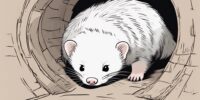What Not to Feed Your Ferret: A Comprehensive Guide
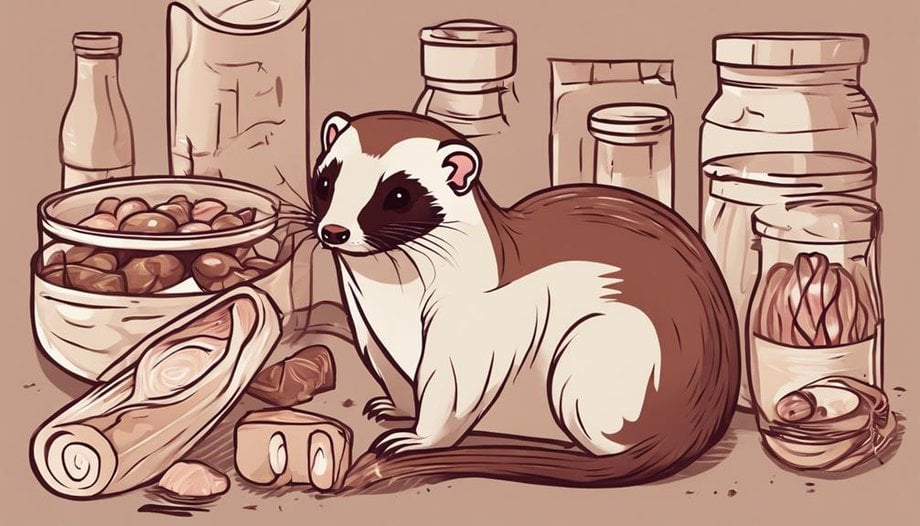
What Not to Feed Your Ferret:
Avoid these foods and household items to keep your ferret healthy and happy.
Toxic Foods
When caring for a ferret, it's crucial to be aware of toxic foods that can harm their health. Ferrets have sensitive digestive systems, making it essential to avoid certain foods. Some common foods toxic to ferrets include chocolate, caffeine, dairy products, and high-sugar treats. Instead of offering these harmful items, consider ferret safe substitutions such as cooked meat, eggs, and certain fruits like bananas and apples in moderation.
Food storage tips are also vital to prevent accidental ingestion of harmful substances. Store all ferret food in secure containers to avoid potential contamination. Keep toxic foods out of reach, locked away in cabinets or high places where ferrets can't access them. Be cautious when preparing meals, ensuring that no toxic ingredients are mistakenly included.
Harmful Household Items
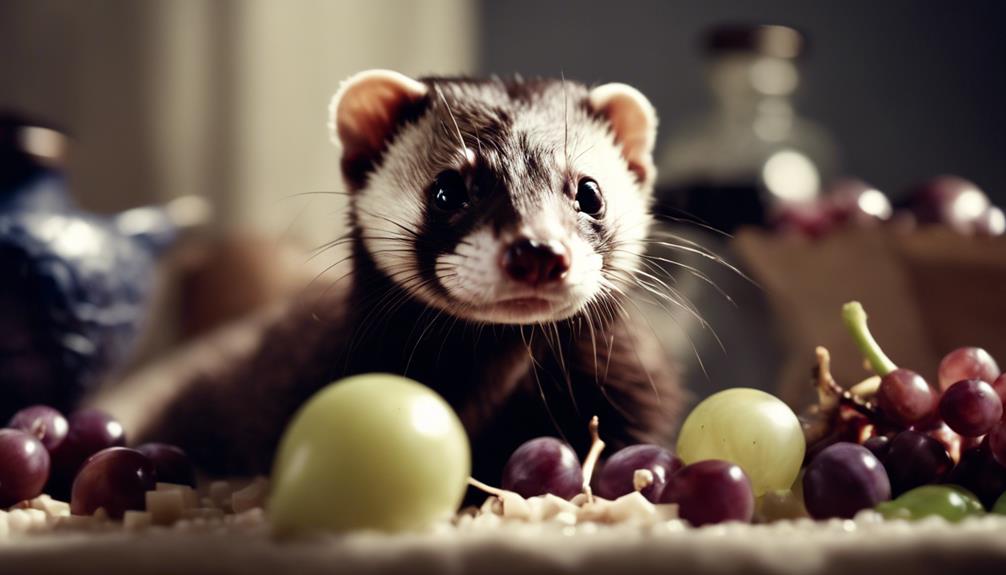
Many household items pose a threat to ferrets, including toxic plants and dangerous chemicals.
It's crucial to be vigilant and keep these items out of reach to prevent accidental ingestion or exposure.
Understanding the risks associated with these common household items is essential for keeping your ferret safe and healthy.
Toxic Plants
To keep your ferret safe, be cautious of toxic plants commonly found in households. Some plants can be harmful to ferrets if ingested. Examples of poisonous plants include philodendrons, lilies, tulips, and daffodils. These plants contain substances that can cause gastrointestinal issues, drooling, difficulty swallowing, and in severe cases, organ damage.
It's crucial to keep these plants out of reach of your ferret or consider removing them from your home altogether. If you suspect your ferret has ingested a toxic plant, contact your veterinarian immediately. Quick action is essential in minimizing any potential harm. By being aware of plant toxicity, you can create a safer environment for your furry friend.
Dangerous Chemicals
Being cautious of toxic plants is vital, and similarly, pet owners must remain vigilant about harmful household items containing dangerous chemicals that could pose a threat to their ferret's health. Chemical exposure risks are prevalent in many common household cleaning products. Ingredients like ammonia, bleach, and phenols found in cleaners can be toxic to ferrets if ingested or inhaled. It's crucial to store these products securely, ensuring they're out of reach of curious ferrets.
Even fumes from these chemicals can harm your pet, so adequate ventilation is essential when using them. Always read labels carefully and opt for pet-safe alternatives to protect your furry friend from accidental poisoning and chemical exposure risks.
Dangerous Plants
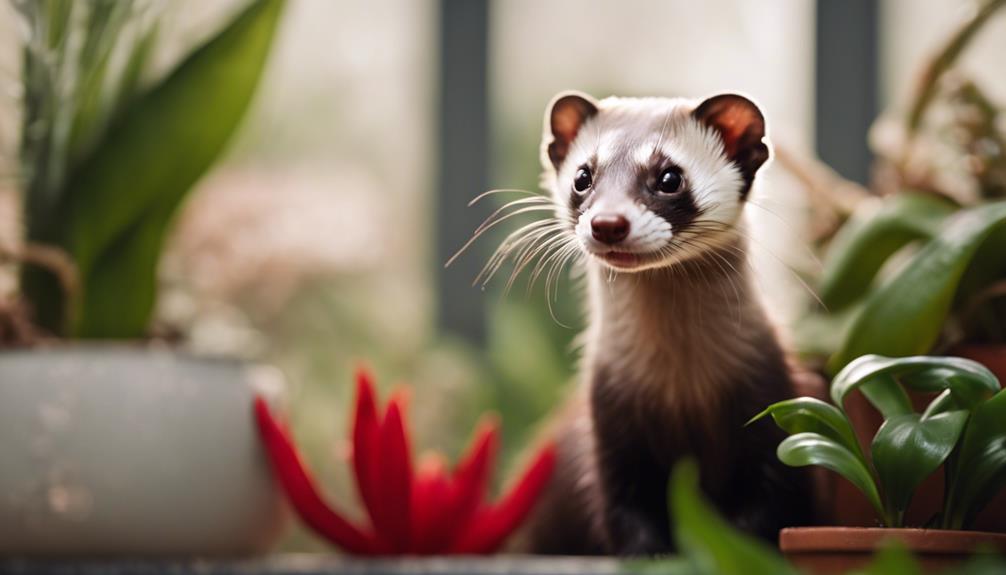
Ferret owners must be aware of the dangers certain plants pose to their pets. Many common household plants, such as lilies and ivy, can be toxic to ferrets if ingested.
It's crucial to research safe plant alternatives to ensure a ferret-friendly environment.
Toxic Plant Dangers
Several common household plants pose a serious risk to the health of your ferret if ingested. It's crucial to be aware of the toxic plant dangers to ensure your ferret's safety. Some key points to consider are:
- Poisonous mushrooms can be fatal if consumed by your ferret.
- Certain indoor gardening plants like lilies, philodendrons, and aloe vera are toxic to ferrets.
- Always research any new plant you bring into your home to confirm its safety for your furry friend.
Safe Plant Alternatives
When considering the safety of your ferret around plants, it's imperative to be mindful of safe plant alternatives to avoid any potential dangers posed by toxic varieties. Ferrets are curious creatures that may nibble on plants during indoor play or exercise routines, so providing safe alternatives is crucial. Here is a table outlining some safe plant options that you can consider for your ferret's play area:
| Safe Plant Alternatives | Benefits | Care Tips |
|---|---|---|
| African Violet | Non-toxic | Keep soil moist |
| Spider Plant | Air-purifying | Moderate sunlight |
| Rosemary | Aromatic | Well-draining soil |
| Blue Echeveria | Easy to grow | Limited watering |
| Bamboo Palm | Pet-friendly | Indirect light |
These plant alternatives can enhance your ferret's environment while ensuring their safety.
Ferret-Safe Treats
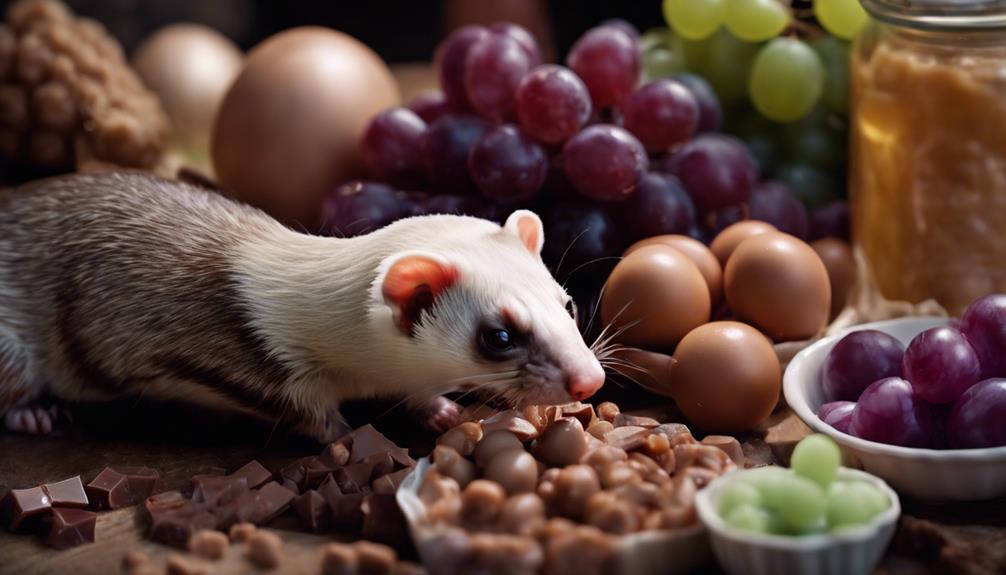
To ensure optimal health and well-being for your ferret, it's important to carefully select treats that are specifically formulated to meet their dietary needs. When it comes to providing ferret-safe treats, here are some recommendations to consider:
- Homemade snacks: Homemade treats can be a great option for ferrets, as they allow you to control the ingredients and ensure that they're free from harmful additives.
- Healthy options: Opt for treats that are nutritious and low in sugar to maintain your ferret's overall health. Consider treats made from high-quality protein sources like meat or eggs.
- Limited quantities: While treats can be a fun way to bond with your ferret, it's essential to offer them in moderation to prevent any digestive issues or weight gain.
Feeding Guidelines
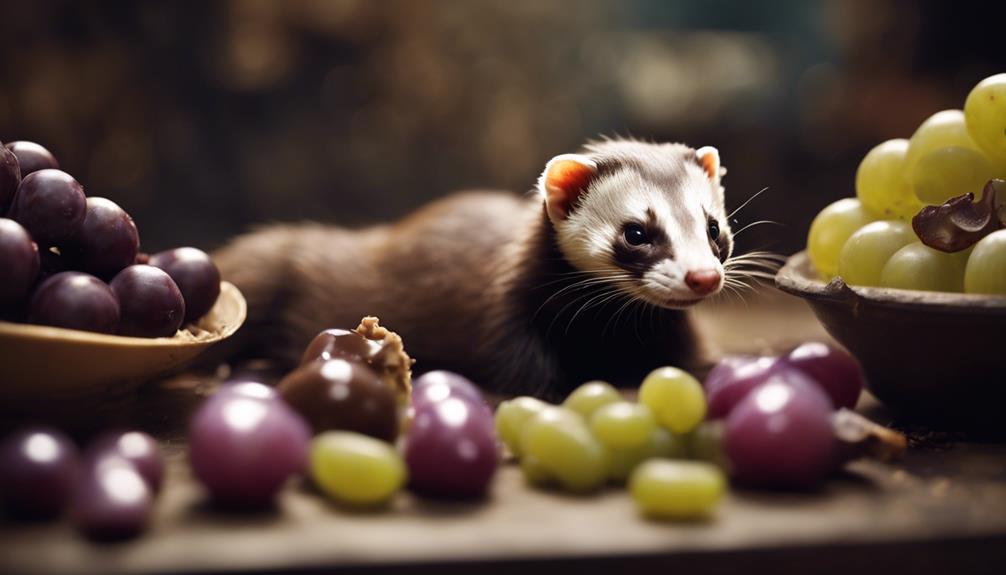
When selecting feeding guidelines for your ferret, it is essential to consider their unique dietary requirements and feeding habits to ensure their nutritional needs are adequately met. Ferrets are obligate carnivores, meaning their diet should primarily consist of animal-based protein sources. Here are some important feeding guidelines to keep in mind:
| Feeding Schedule | Portion Sizes | Food Allergies, Intolerances |
|---|---|---|
| Ferrets should be fed 2-4 meals a day to mimic their natural eating pattern. | Portion sizes should be moderate to prevent obesity. Consult your vet for specific recommendations based on your ferret's weight and activity level. | Ferrets can have allergies or intolerances to certain foods. Common allergens include grains, dairy, and some fruits. Always monitor your ferret for any signs of adverse reactions after trying new foods. |
Health Risks
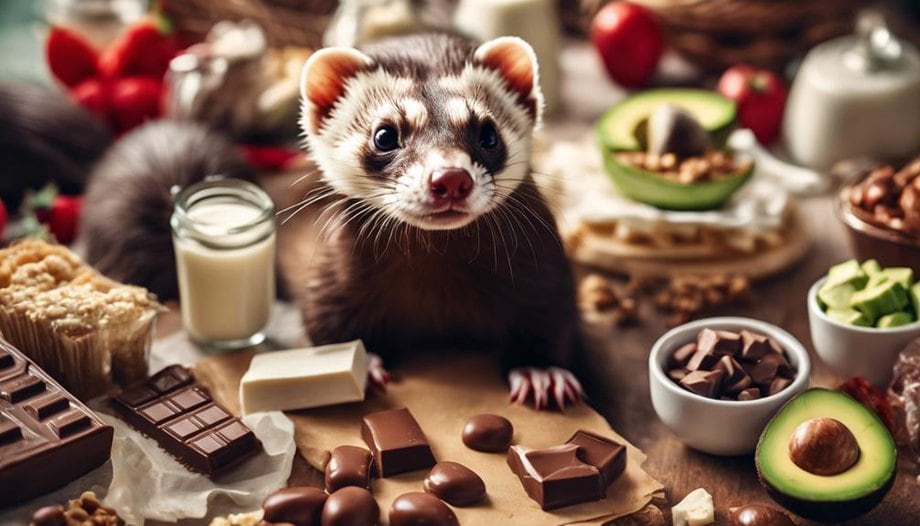
Ferret owners should be aware of the various health risks that can affect their pets, ranging from common ailments to potentially serious conditions. It's crucial to understand how certain factors like dietary supplements and digestive issues can impact a ferret's well-being. Here are some important health risks to keep in mind:
- Dietary Supplements: While some dietary supplements may seem beneficial, others can be harmful to ferrets. Certain vitamins and minerals, when given in excess, can lead to toxicities and health problems. It's essential to consult with a veterinarian before introducing any supplements into your ferret's diet.
- Digestive Issues: Ferrets are prone to digestive problems such as gastrointestinal blockages or foreign body obstructions. These issues can arise from ingesting inappropriate items or foods that are difficult to digest. Maintaining a proper diet and ensuring your ferret doesn't have access to hazardous materials can help prevent digestive complications.
Being vigilant about these health risks and taking proactive measures can significantly contribute to your ferret's overall health and well-being.
Ferret Nutrition
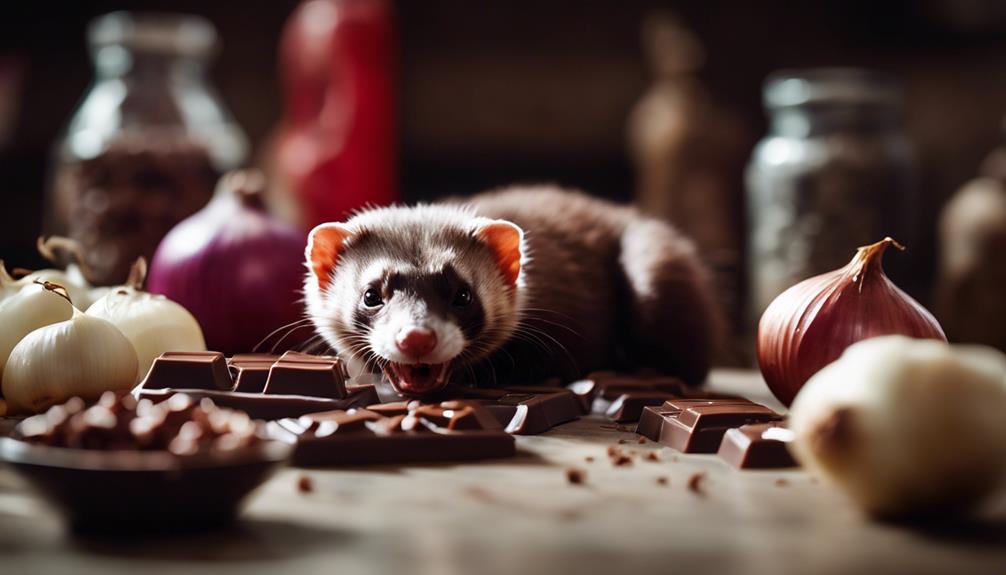
With a diverse diet rich in high-quality protein sources, ferret nutrition plays a crucial role in maintaining their overall health and vitality. Ferrets are obligate carnivores, meaning they require a diet high in animal-based proteins and fats. It is essential to provide a balanced diet to ensure they receive all the necessary nutrients for optimal health. Along with a quality ferret-specific food, supplements can be beneficial to address specific nutritional needs. However, it's essential to consult with a veterinarian before adding any supplements to your ferret's diet to avoid potential imbalances.
| Category | Recommended Foods | Foods to Avoid |
|---|---|---|
| Protein | High-quality meat such as chicken, turkey, or lamb | Dairy products, sugary treats |
| Fats | Healthy fats like fish oil | High-sugar or high-carb treats |
| Vitamins & Minerals | Ferret-specific supplements | Human vitamins or minerals |
When considering ferret diet restrictions, it's crucial to avoid foods that can be harmful to them. Dairy products, high-sugar treats, and high-carb foods should be strictly avoided. Always prioritize high-quality protein sources and consult with a vet before introducing any new foods or supplements to your ferret's diet.
Frequently Asked Questions
Can Ferrets Eat Avocados?
Ferrets should not eat avocados due to the risk of toxicity. Avocados contain a substance called persin, which can be harmful to ferrets. It's essential to be aware of potential ferret allergies and avoid feeding them avocados.
Is It Safe for Ferrets to Chew on Rubber Bands or Plastic Bags?
Is it safe for ferrets to chew on rubber bands or plastic bags? While ferrets may find these items intriguing as toys, they pose serious risks. Plastic can cause digestive issues, and rubber bands can lead to choking hazards. Opt for safe, ferret-friendly toys.
Are All Types of Lilies Toxic to Ferrets or Just Specific Ones?
Lily varieties can be toxic to ferrets. Owners should avoid exposing their furry friends to any type of lilies due to potential harm. When considering a ferret's diet, precautions must be taken to ensure their safety and well-being.
What Are Some Examples of Ferret-Safe Fruits That Can Be Given as Treats?
Ferrets enjoy a variety of safe fruits as treats, such as bananas, apples, and blueberries. These can be used to enhance ferret enrichment and as rewards during training sessions. Always offer in moderation to prevent digestive issues.
How Often Should I Feed My Ferret to Maintain a Healthy Diet?
To keep a ferret at its finest, feed it a balanced diet on a regular schedule, controlling portions. Ensure they get all nutrients needed, possibly with dietary supplements. This care will maintain their health.

